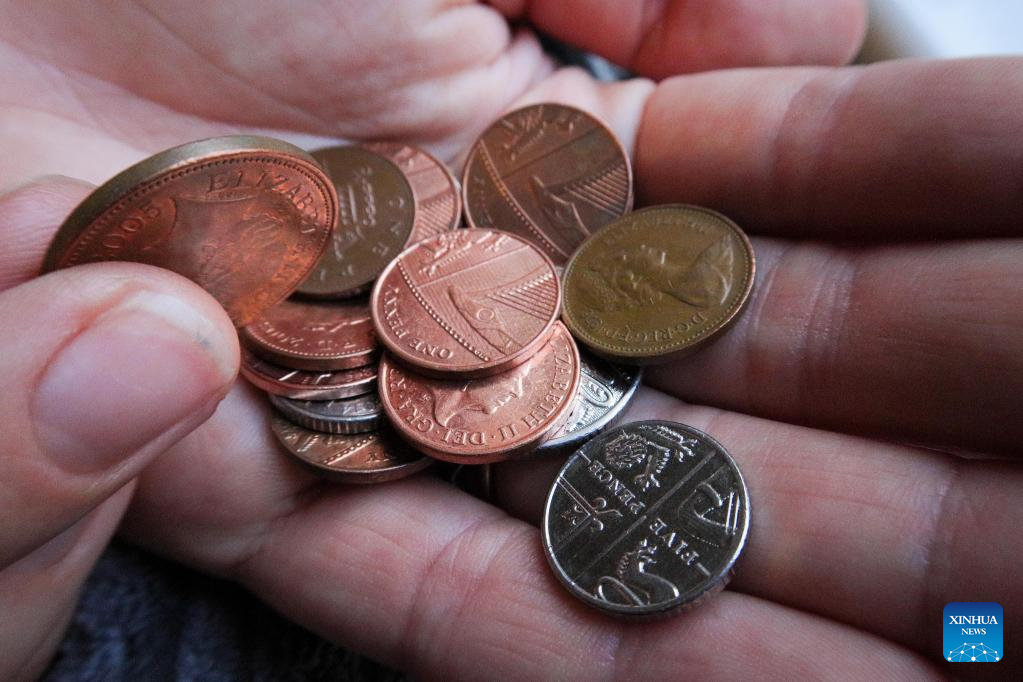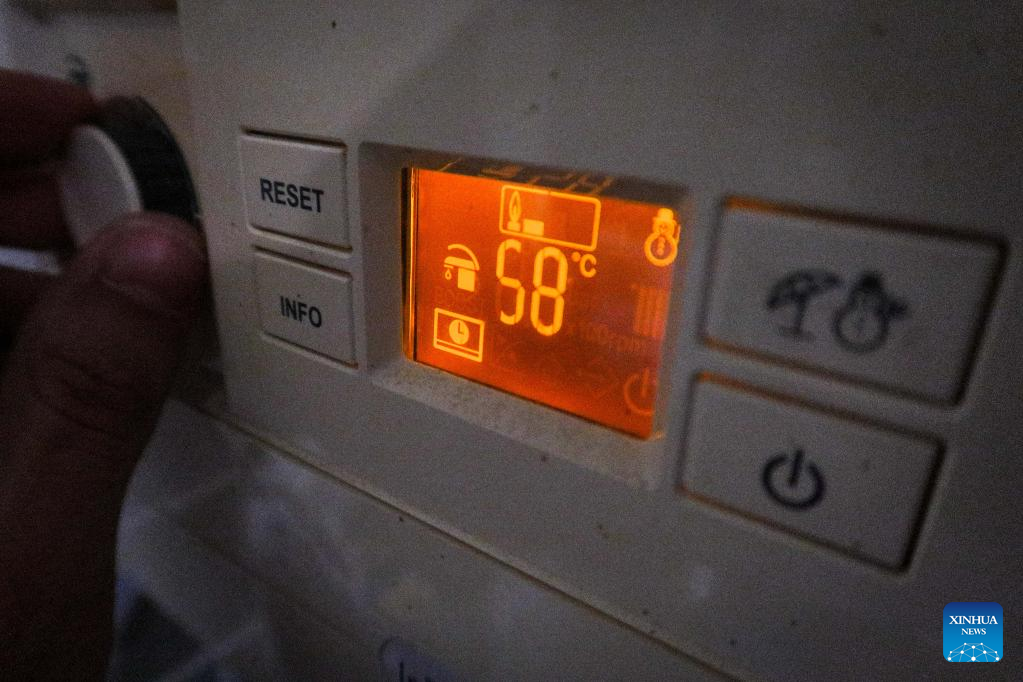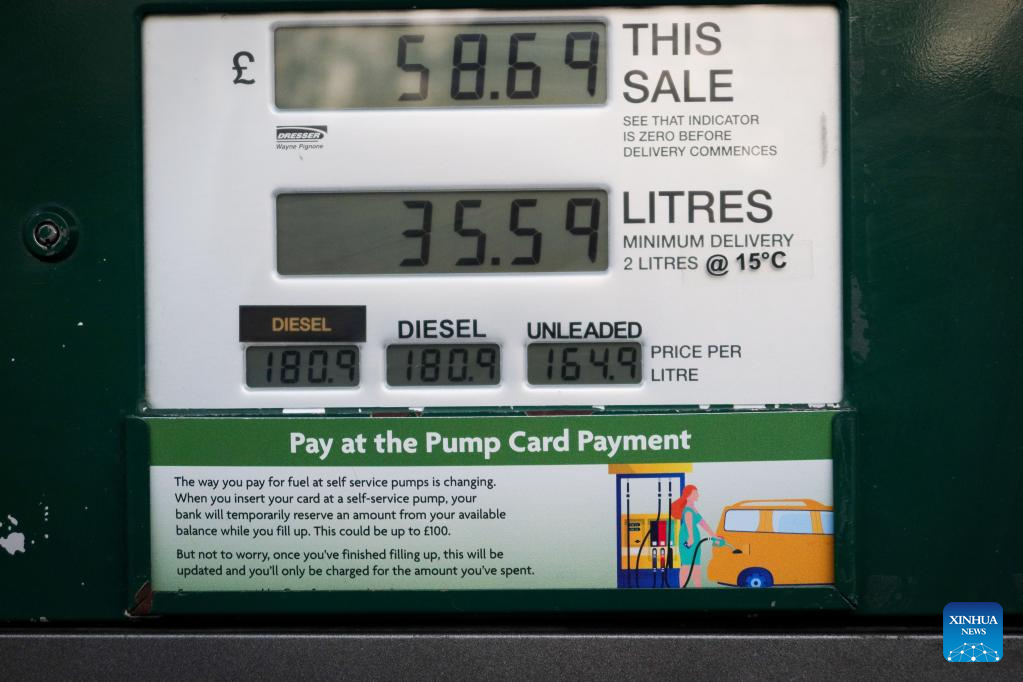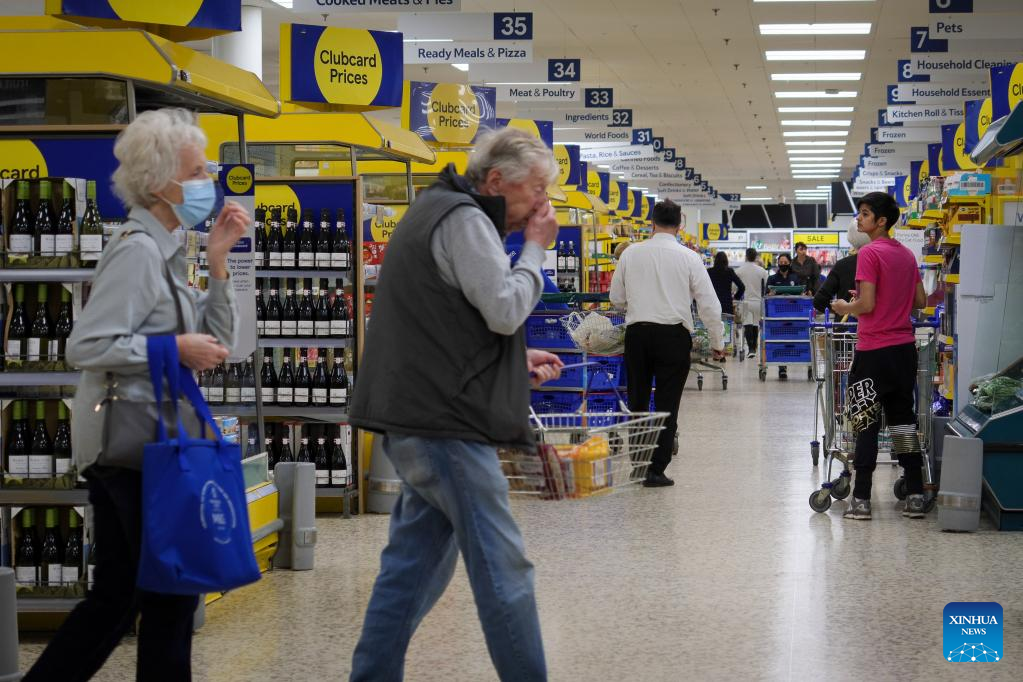
Photo taken on March 23, 2022 shows British coins in Basingstoke, Britain. Britain's Consumer Prices Index (CPI) rose by 6.2 percent in the 12 months to February 2022, up from 5.5 percent in January, hitting a 30-year high, official statistics showed Wednesday. (Photo by Tim Ireland/Xinhua)
LONDON, March 23 (Xinhua) -- Britain announced tax cuts on Wednesday as the latest official statistics showed its inflation rose to a 30-year high in February, but industry leaders and analysts have said the measures could play a limited role in stopping the worsening cost-of-living crisis.
In the 12 months to February 2022, Britain's Consumer Prices Index (CPI) rose by 6.2 percent, up from 5.5 percent in January, according to the country's Office for National Statistics (ONS) on Wednesday.
On a monthly basis, the CPI rose by 0.8 percent in February 2022, compared with a rise of 0.1 percent in February 2021, and that was the largest monthly CPI increase between January and February since 2009, the ONS added.
"Inflation rose steeply in February as prices increased for a wide range of goods and services, for products as diverse as food to toys and games," ONS chief economist Grant Fitzner said.
Clothing and footwear saw a return to traditional February price rises after last year's falls when many shops were closed, and furniture and flooring also contributed to the rise in inflation as prices started to recover following new year sales, Fitzner added.
Amid the soaring prices, a cost-of-living crisis was aggravated. Record high inflation now means a typical single parent will face paying out an estimated additional 315 pounds (415 U.S. dollars) in food and heating this year compared to 2019, while bills for a family of four are likely to jump 580 pounds, according to Matt Whittaker, chief executive officer at British charity Pro Bono Economics.
"With inflation driven by staples such as food and fuel, the everyday impacts of inflation will be felt most sharply by the poorest," Whittaker added.
Worse yet, an increased energy price cap was expected to push inflation even higher and deal yet another blow to household finances.
Britain's energy regulator has announced that the cap would jump from the current 1,277 pounds to reach 1,971 pounds per year in April for about 22 million customers.
Inflation is likely to hit at least 8 percent this spring, reaching the highest in 40 years, said Jack Leslie, senior economist at British think tank Resolution Foundation.
"This prolonged period of high inflation -- which millions of people have simply never experienced before -- is a complete disaster for living standards," he said.
Britain's central bank, the Bank of England, lifted the benchmark interest rate to 0.75 percent earlier this month to bring down the inflation that was far above its 2-percent target. But analysts have expressed concerns that rate hikes would not be helpful.
"Energy prices are set on a global or at least continental basis, so raising UK interest rates will do nothing to reduce energy prices and help calm inflation," said Tom Pugh, an economist at business advisory firm RSM UK.
Against such a backdrop of soaring prices across the board and the deepening cost-of-living crisis, Chancellor of the Exchequer Rishi Sunak said Wednesday in his Spring Statement speech that the government will raise the income threshold for people to start paying National Insurance by about 3,000 pounds to 12,570 pounds in July.
It is a 6-billion-pound tax cut for 30 million people across the country, and a tax cut for employees worth over 330 pounds a year, Sunak added.
Fuel duty has also been cut by five pence per liter, which took effect on Wednesday. And the Employment Allowance, which cuts small businesses' tax bills and makes it cheaper to employ workers, will increase from 4,000 pounds to 5,000 pounds in April.
Nevertheless, financial hardship facing British households was expected to continue.
With the energy price cap rising in April, and inflation running at a 30-year high, "households are likely to see a fall in their discretionary income over the course of 2022," said Helen Dickinson, chief executive of the British Retail Consortium.
Businesses were also under pressure. Noting that firms will welcome some positive announcements, Director General of the British Chambers of Commerce Shevaun Haviland said it "did not fundamentally address the huge cost pressures they are facing."
"The cut in fuel duty, though very welcome, is just a drop in the ocean compared to the larger tsunami of surging costs that is bearing down on firms and households," Haviland added.
"Smaller businesses are particularly exposed as they have neither the protections or financial support provided to households, nor the negotiating power of larger businesses."
Also on Wednesday, the Office for Budget Responsibility published the latest update of its economic and fiscal forecasts. "In the medium term, a sustained increase in global energy prices could lower potential output for a net energy importer like the UK," it noted.
And while vaccines have reduced the COVID-19 pandemic-related uncertainties, "the recent rise in hospitalisations demonstrate that Covid remains a risk," it added. (1 pounds= 1.32 U.S. dollars) ■

Photo taken on March 23, 2022 shows a closed pump in a petrol station in Basingstoke, Britain. Britain's Consumer Prices Index (CPI) rose by 6.2 percent in the 12 months to February 2022, up from 5.5 percent in January, hitting a 30-year high, official statistics showed Wednesday. (Photo by Tim Ireland/Xinhua)

Photo taken on March 23, 2022 shows a gas boiler display in a family in Basingstoke, Britain. Britain's Consumer Prices Index (CPI) rose by 6.2 percent in the 12 months to February 2022, up from 5.5 percent in January, hitting a 30-year high, official statistics showed Wednesday. (Photo by Tim Ireland/Xinhua)

Photo taken on March 23, 2022 shows a pump in a petrol station in Basingstoke, Britain. Britain's Consumer Prices Index (CPI) rose by 6.2 percent in the 12 months to February 2022, up from 5.5 percent in January, hitting a 30-year high, official statistics showed Wednesday. (Photo by Tim Ireland/Xinhua)

People shop at a supermarket in Basingstoke, Britain, March 23, 2022. Britain's Consumer Prices Index (CPI) rose by 6.2 percent in the 12 months to February 2022, up from 5.5 percent in January, hitting a 30-year high, official statistics showed Wednesday. (Photo by Tim Ireland/Xinhua)
